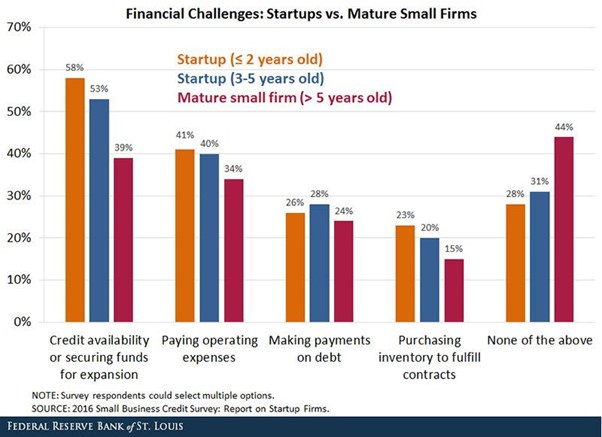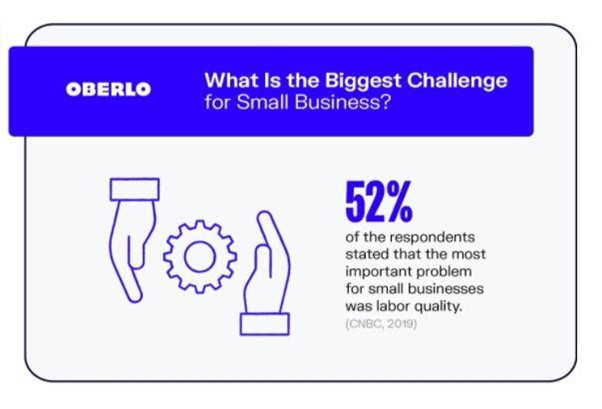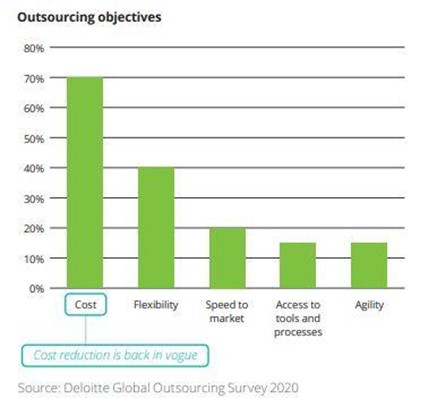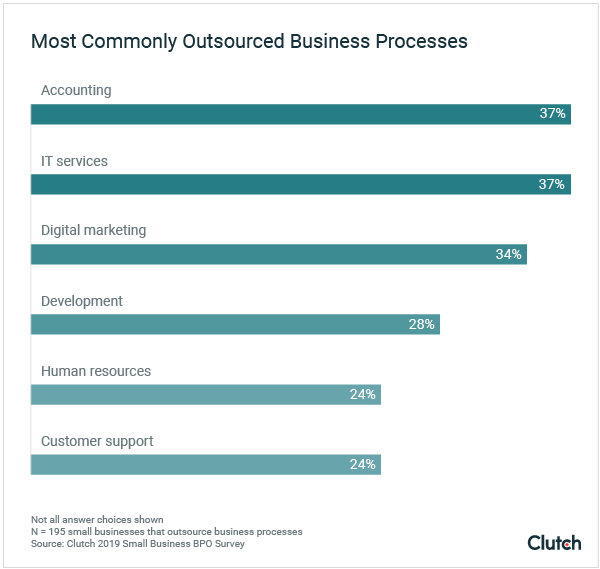How to Improve Your Small Business With Outsourcing
Outsourcing tasks can help your business grow, save time, money, and become more agile.
Small businesses face many different challenges and they have to keep finding new ways to deal with them. Some of the problems they often come across can be solved by small business outsourcing where specific tasks to contractors or even outsourcing entire departments.
Even large businesses can benefit from outsourcing, although you’d expect them to have the necessary resources to do everything in-house. Small companies, given their lack of resources, can profit even more. In fact, around 80% of small businesses plan to outsource some portion of their business in 2021, compared to 52% just two years ago.
Finding the right contractor has become much easier and cheaper lately, thanks to the development of the internet and digital tools that can help us with it. So how exactly can outsourcing help you grow your business? And what can you do to make the most of it? Let’s check this in a bit more detail.
How to Implement Small Business Outsourcing
1. Freeing Up Your Budget
One of the resources that small businesses are almost always missing is money.
Having a person or a whole department on a specific task 24/7 or 40 hours a week makes sense only if they actually spend most of their workdays dealing with the task.
However, too often, this is completely unnecessary and also very expensive. In this case, it’s reasonable to try outsourcing. So how do you save money on that?
It’s pretty simple. You save money by paying the contractor for the actual amount of work they’ve done – by the hour or by the project. You don’t waste money on full-time employees who waste their time. Instead, you’ll maximize your cost-effectiveness by paying only as much as you get.
It’s also no mystery how freeing up your budget will help your company. The money you would normally spend on a full-time worker can be invested in other areas of your business that will help you drive growth. So you should try analyzing which departments and individuals are the least productive and why it is so. If the only reason is that there’s simply not enough work for them, you should think about outsourcing their job.
2. Flexible and Smooth Scaling Process
Companies that outsource some of their operations are often better prepared to adjust to new circumstances if their business starts expanding or shrinking. It’s not just about making your business grow, it’s also about preventing confusion and disorder once more work and more clients start pouring in.
And when that happens, you can simply offload the excess work to an outside provider, instead of hastily looking for a bunch of new employees. There may be no need to change the inner workings of your company, introduce new departments, nor hire more people full-time.
Also, if the tide turns, you won’t be left with a bunch of people you have to keep on your payroll although there’s literally no work for them, or with people you would simply have to fire. It’s a lot easier to terminate the agreement with an outsourcer than to get into the process of firing your own workers.
3. Boosting Your Businesses Efficiency
Small businesses sometimes don’t have clearly differentiated roles, and you’ll often see people doing multiple different jobs on their own. They simply have no need or no budget for several full-time employees that would do the job instead. Owners often wear too many hats – they end up being an accountant, a marketing manager, an HR rep, and who knows what else.
And this goes not just for owners, of course. While it is no surprise that a small company would try to get their employees to multitask in order to save a few dimes, the employees might get overstretched in the process. If people aren’t fully focused on what they do best, the whole organization will be much less efficient.
Outsourcing comes as a perfect solution here. You find the right people who understand what you need, pay their fee, and just let them focus on their job. You can expect them to be much more productive if they don’t have to switch their roles back and forth constantly.
4. Gaining Access to a Huge Talent Pool
Now that we’ve mentioned the “right people”, let’s see how outsourcing helps with talent recruitment. First and foremost, by deciding to outsource you’ve basically opened up your company towards a global labor market. This means you’ll have a wide variety of options and a chance to hire top-class professionals from around the world.
This way you’ll get not just someone who can be concentrated exclusively on their job, but also someone who’s really good at this job. And someone you maybe couldn’t even afford full-time, but who’s well within the limits of your budget if you pay them by the project or by the hour.
Also, the fact that the global labour market entails global competition usually means that the rates and fees you’ll pay won’t be overinflated. Especially given that you’re gaining access to talent from areas where labor costs are lower. All this is critical, as these costs usually represent a large chunk of total expenditures and a huge burden for most small businesses.
5. Gaining Access to Key Technologies and Resources
Some industries today require solid technological capabilities and a reliable IT infrastructure. And this gets very expensive. That is, it can be very expensive if you plan to work with new groundbreaking software and your own IT team to support it.
But if you decide to offload this kind of work to a contractor, they will often use their own infrastructure and basically share it with you. Of course, this way you’re just “renting” it, but for most small businesses like podcast advertising companies it’s the only way to utilize cutting-edge software and other technologies that can improve their business significantly.
This goes not just for IT support, but also when it comes to access to other important digital resources, such as customer data or cloud storage memory. And the fact that your employees don’t have to learn how to use complicated digital tools is also a bonus and will save a ton of time.
Discover How SpotlerCRM Can Help With Your Email Campaigns
6. A Chance to Focus On Your Core Business
Probably the biggest benefit of outsourcing is the chance for your business to simply focus on what you do. You can offer a high-quality product or service only if you’re fully devoted to making it actually good.
But small business owners and employees are often overstretched, as side tasks draw too much attention away from their core business. And outsourcers can help you with freeing up your schedule from unnecessary distractions and enabling you to do your thing.
So if you don’t outsource some of the side activities, you may end up outsourcing one of your core activities. And this is something you should never do. Which opens the question, which tasks can you outsource? And how can this help your business grow?
Let’s take just a quick overview.
Small Business Outsourcing Ideas
In general, you shouldn’t outsource anything that involves your core capabilities.
Mark Resnick, a small business consultant and director of the Institute for Technology Innovation at Florida International University, puts it this way:
“Small businesses must identify their core competencies and capabilities and focus their own R&D, talent management and resources on being the best in their industry at these. Outsourcing any aspect of [these tasks] would be a big mistake because they would cease to offer anything that their own customers couldn’t get elsewhere. So a small business that focuses on product design should not outsource anything related to developing its internal design talent or their design activities.”
The best tasks for small business outsourcing involve either highly repetitive jobs that just waste your time, or highly skilled jobs that your company can’t handle. Here are some ideas:
Marketing: Small business owners should remember that marketing is much more than uploading news and photos to your brand’s Instagram profile. Getting your marketing into the hands of experts can help you get noticed and target the right audience.
Website development: young small businesses can sometimes allow themselves to have a second-rate website until they’re up and running. But companies that intend to grow shouldn’t neglect this aspect of their business. Your website is the centre of your online activities and the basis of your digital identity, so you should probably find some professionals to get it right and to provide continuous tech support.
Accounting: unless they’re very lucky, small businesses don’t make enough money to need a separate accounting department. Finding someone to deal with the wages, taxes, bonuses, and loans is a good way to go.
Shipping and logistics: this is especially convenient for those looking to boost their online shops. Let the provider handle shipping while you’re keeping an eye on the supply chain, managing your storage, or developing your marketing strategy.
Customer service: it can be very useful for a small company to outsource its customer service. Nevertheless, you should be careful and patient here as customer service reps will need to learn a lot of stuff about your business before they can do the job properly. You just make sure you hire a company that’s reputable and that’s right for you.
Final Thoughts
All in all, what you need to know about outsourcing is that it can save time and money when done in a proper way. With more time and more money, there are also more opportunities to grow. And once you start growing, outsourcing can help you handle that growth and make your business easily scalable.
Of course, you have to ensure you pick the right company to help you out. Remember, you’re basically entrusting someone else to run a part of your business, so better make it someone really reliable and competent. Spending just a bit more time looking for the right option can make a huge difference in the long run.
Really Simple Systems is now Spotler CRM
The same great technology, a CRM platform that is focused on the needs of B2B marketers, provided by the same great team, at a great price!



